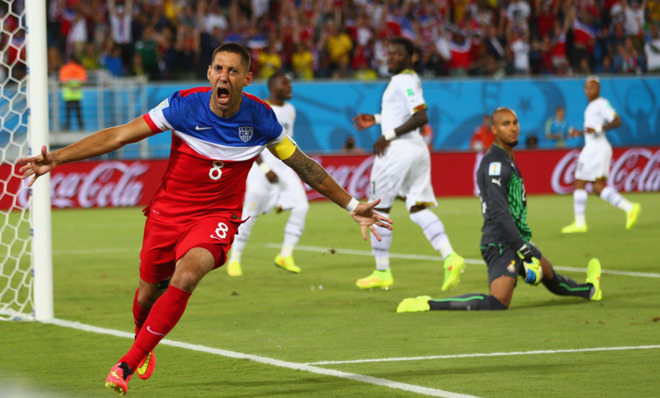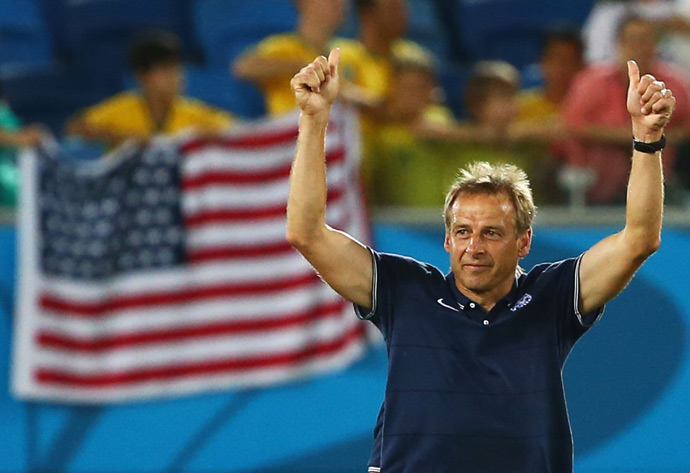Face it, America: The U.S. men's soccer team is pretty bad
An undeserved win has prompted a heaping of undeserved praise


A free daily email with the biggest news stories of the day – and the best features from TheWeek.com
You are now subscribed
Your newsletter sign-up was successful
After an extraordinary start, the World Cup saw its first day of truly mediocre soccer on Monday. It is no coincidence that Monday also saw the debut of the U.S. men's team.
Don't get me wrong. The U.S.'s 2-1 victory over Ghana was about as dramatic as they come, a fitting chapter in what has turned out to be an improbable rivalry stretching over three World Cups. Clint Dempsey scored a fine goal in the first minute, before powering through a broken nose to complete the game. John Brooks came off the bench to score the winning header just moments before the final whistle, lifting the spirit of a team that had been battered like a punching bag for a solid 80 minutes.
But good soccer this was not. The U.S. played about as badly as you could play while still winning. And yet it is impossible to escape the overwhelming sense in the American media today that Team USA's victory over Ghana was somehow a triumph.
The Week
Escape your echo chamber. Get the facts behind the news, plus analysis from multiple perspectives.

Sign up for The Week's Free Newsletters
From our morning news briefing to a weekly Good News Newsletter, get the best of The Week delivered directly to your inbox.
From our morning news briefing to a weekly Good News Newsletter, get the best of The Week delivered directly to your inbox.
Every World Cup we are treated to a slew of stories about how this time the U.S. team will be different, which is to say a step above its usual uninspired play. Driving the hype this time around is the U.S.'s coach, the German Jurgen Klinsmann, a gifted former player famous for his blistering speed, his ultra-competitiveness, and his penchant for soaring when he could merely dive.

Klinsmann promised a more attacking kind of football. As Matthew Futterman wrote in one of the many profiles of Klinsmann in the run-up to the tournament: "Mr. Klinsmann taught the U.S. players to see the field differently — to impose themselves on opposing defenses, and for defenders to push high into the middle of the field and even to join the attack." As Klinsmann himself said, "You want to play an open game. You want to put your stamp on the game."
Sounds good, right? And so it was with some curiosity that I tuned in last night for my quadrennial viewing of the United States team — only to find the same dull, flabby soccer that has defined America's playing style for decades.
For most of the game, the U.S. was seemingly incapable of stringing together more than three passes at a time. Michael Bradley, supposedly the linchpin of the midfield, gave the ball away every other touch. It's bad enough that the U.S.'s sole striker is Jozy Altidore, who scored all of one goal last season for his club Sunderland, but he pulled up with a hamstring injury early in the game, leaving the U.S. with literally zero offensive options.
A free daily email with the biggest news stories of the day – and the best features from TheWeek.com
Then there's the defense, which was as adept at keeping its shape as a Jenga tower, falling apart at the slightest offensive push by the Ghanians. John Brooks may have turned out to be a hero, but the Ghanians appeared to be running at him as if he were the weakest link in an already fragile defensive chain. More shockingly, the Black Stars won the vast majority of 50-50 balls, easily out-muscling and out-hustling an American team that should at least be as fit as its opponents.
But all these glaring flaws were largely glossed over in the glow of victory. The U.S. defense was an "impenetrable force field," according to The New York Times. USA Today praised the team's "depth" and "workmanlike defense." CBS hailed Team USA for "bossing a match when it mattered most," and for "finding a way to be economical and resourceful and cunning and alert when all is on the line against an elite opponent."
Oh, please. This is shameless propaganda. It all fits the same pattern: ridiculous overpraise that is in no way connected to the reality on the pitch, fueling outsized expectations that cannot possibly be met. Klinsmann may want to institute a regime of lively, attacking soccer, but that seems like a pure fantasy when you take into account the players on his squad.
Now, of course, the national press is bound to overstate the national team's achievements. This happens everywhere. It is World Cup mania, after all. But in case there was any doubt about the truth of the matter, it is this: the American team is not very good.
Ryu Spaeth is deputy editor at TheWeek.com. Follow him on Twitter.